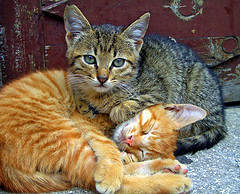Can Your Cat Cause Mental Illness?
Is your cat’s litter box a breeding ground for mental illness?

Maybe.
New research from Johns Hopkins University has hypothesized that a parasite called Toxoplasma gondii, commonly found in cat feces, can enter the human brain and cause psychotic behaviors.
According to the U.S. National Institute of Mental Health, “schizophrenia is a chronic, severe and disabling brain disorder that affects about 1.1 percent of the U.S. population age 18 and older in a given year.”
Though the exact cause of schizophrenia is a medical mystery, scientists believe that both genetics and the environment may play a role.
Dr. Robert H. Yolken, director of developmental neurobiology at the Johns Hopkins Children’s center and principal investigator in this study said he has long been investigating the link between infections and schizophrenia. Past studies have attempted to link viruses such as the flu or herpes with schizophrenia.
Yolken said he believes tackling the parasite may help unravel the mystery of schizophrenia.
“It’s a pretty good opportunity to relieve a pretty large burden of disease,” Yolken said.
Humans are infected with T. gondii either from coming into direct contact with cat feces, eating undercooked meat that has been infected or drinking unfiltered water.
This infection, called toxoplasmosis, usually only causes minimal flu symptoms. Most of the time, people aren’t even aware that they have become infected.
Yolken said he believes that approximately 1/3 of the world’s population has toxoplasmosis.
In this study, Yolken and his research team carefully reviewed military medical records. According to their findings, soldiers with toxoplasmosis were more than twice as likely to develop schizophrenia.
Glenn McConkey, a scientist at the University of Leeds in England, led research last year that linked T. gondii with the creation of dopamine, a neurotransmitter that regulates behavior and can cause psychotic problems when not regulated properly by the human brain.
Though these scientists may have made an important discovery, a great deal of work still needs to be done before it can be conclusively determined that cats are linked to schizophrenia.
However, for those who are concerned, there are many preventative hygienic measures that, if carefully followed, can protect people from becoming infected with T. gondii.
For cat owners, these include emptying litter boxes once a day, disposing of litter in sealed plastic bags, feeding cats only commercial cat food, covering children’s sandpits and washing hands after coming into contact with a cat.
For all others, the safety precautions are more basic: wear gloves when gardening, wash fruits and vegetables well before consuming, cook meat thoroughly and filter all drinking water.
To reach staff reporter, Rebecca Buddingh, click here.



